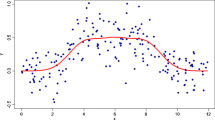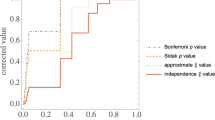Abstract
Ockham’s razor is the principle that, all other things being equal, scientists ought to prefer simpler theories. In recent years, philosophers have argued that simpler theories make better predictions, possess theoretical virtues like explanatory power, and have other pragmatic virtues like computational tractability. However, such arguments fail to explain how and why a preference for simplicity can help one find true theories in scientific inquiry, unless one already assumes that the truth is simple. One new solution to that problem is the Ockham efficiency theorem (Kelly 2002, Minds Mach 14:485–505, 2004, Philos Sci 74:561–573, 2007a, b, Theor Comp Sci 383:270–289, c, d; Kelly and Glymour 2004), which states that scientists who heed Ockham’s razor retract their opinions less often and sooner than do their non-Ockham competitors. The theorem neglects, however, to consider competitors following random (“mixed”) strategies and in many applications random strategies are known to achieve better worst-case loss than deterministic strategies. In this paper, we describe two ways to extend the result to a very general class of random, empirical strategies. The first extension concerns expected retractions, retraction times, and errors and the second extension concerns retractions in chance, times of retractions in chance, and chances of errors.
Similar content being viewed by others
References
Akaike, H. (1973). Information theory and an extension of the maximum likelihood principle. In Second international symposium on information theory (pp. 267–281).
Baker, A. (2003). Quantitative parsimony and explanatory power. British Journal for the Philosophy of Science, 54, 245–259.
Baker, A. (2007). Occam’s razor in science: A case study from biogeography. Biology and Philosophy, 22, 193–215.
Cartwirght, N. (1999). The dappled world: A study of the boundaries of science. Cambridge: Cambridge University Press.
Garey, M., & Johnson, D. (1979). Computers and intractability: A guide to the theory of NP-completeness. New York: Freeman.
Fishburn, P. (1972). On the foundations of game theory: The case of non-Archimedean utilities. International Journal of Game Theory, 2, 65–71.
Forster, M. (2001). The new science of simplicity. In A. Zellner, H. Keuzenkamp, & M. McAleer (Eds.), Simplicity, inference and modelling. (pp. 83–119). Cambridge: Cambridge University Press.
Forster, M., & Sober, E. (1994). How to tell when simpler, more unified, or less ad hoc theories will provide more accurate predictions. The British Journal for the Philosophy of Science, 45, 1–35.
Friedman, M. (1983). Foundations of spacetime theories: Relativistic physics and philosophy of science. Princeton: Princeton University Press.
Gärdenfors, P. (1988). Knowledge in flux: Modeling the dynamics of epistemic states. Cambridge: MIT Press.
Harman, G., & Kulkarni, S. (2007). Reliable reasoning: Induction and statistical learning theory. Cambridge: MIT Press.
Heath, D., & Sudderth, W. (1972). On a theorem of de Finetti, oddsmaking and game theory. Annals of Mathematical Statistics, 43(6), 2072–2077.
Hempel, C. (1966). Philosophy of natural science. Englewood Cliffs: Prentice Hall.
Hitchcock, C., & Sober, E. (2004). Prediction versus accommodation and the risk of overfitting. British Journal for the Philosophy of Science, 55, 1–34.
Jeffreys H. (1961). Theory of probability. Oxford: Clarendon Press.
Kadane, J., Schervish, M., & Seidenfeld, T. (1999). Rethinking the foundations of statistics. Cambridge: Cambridge University Press.
Karlin, S. (1950). Operator treatment of the minimax principle. In H. W. Kuhn, & A. W. Tucker (Eds.), Contributions to the theory of games. Annals of mathematics studies (Vol. 24, pp. 133–154). Princeton, NJ: Princeton University Press.
Karlin, S. (1959). Mathematical methods and theory in games, programming and economics. Reading: Addison-Wesley.
Kelly, K. (2002). Efficient convergence implies Ockham’s razor. In Proceedings of the 2002 international workshop on computational models of scientif ic reasoning and applications, Las Vegas, USA, 24–27 June.
Kelly, K. (2004). Justification as truth-finding efficiency: How Ockham’s razor works. Minds and Machines, 14, 485–505.
Kelly, K. (2007). A new solution to the puzzle of simplicity. Philosophy of Science, 74, 561–573.
Kelly, K. (2007). How simplicity helps you find the truth without pointing at it. In V. Harazinov, M. Friend, & N. Goethe (Eds.), Philosophy of mathematics and induction (pp. 321–360). Dordrecht: Springer.
Kelly, K. (2007). Ockham’s razor, empirical complexity, and truth-finding efficiency. Theoretical Computer Science, 383, 270–289.
Kelly, K. (2007). Simplicity, truth, and the unending game of science. In S. Bold, B. Löwe, T. Räsch, & J. van Benthem (Eds.), Infinite games: Foundations of the formal sciences V (pp. 223–270). Roskilde: College Press.
Kelly, K. (2008). Ockham’s razor, truth, and information. In J. Van Benthem, & P. Adriaans (Eds.), Philosophy of information (pp. 321–360). Dordrecht: Elsevier.
Kelly, K. (2010). Simplicity, truth, and probability. In M. Forster, & P. Bandyopadhyay (Eds.), Handbook on the philosophy of statistics. Dordrecht: Kluwer.
Kelly, K., & Glymour, C. (2004). Why probability does not capture the logic of scientific justification. In C. Hitchcock (Ed.), Contemporary debates in the philosophy of science (pp. 94–114). Oxford: Blackwell.
Kelly, K., & Mayo-Wilson, C. (2008). Review of Gilbert Harman and Sanjeev Kulkarni. Reliable reasoning: Induction and statistical learning theory. Notre Dame Philosophical Reviews. http://ndpr.nd.edu/board.cfm. Accessed 18 March 2008.
Kelly, K., & Mayo-Wilson, C. (2010). Ockham efficiency theorems for random empirical methods. Technical Report 186. Department of Philosophy, Carnegie Mellon University. http://www.hss.cmu.edu/philosophy/techreports/186_Mayo-Wilson.pdf.
Kelly, K., & Mayo-Wilson, C. (2010). Causal conclusions that flip repeatedly and their justification. In: P. Grunwald & P. Spirtes (Eds.), Proceedings of the 26th conference on uncertainty in artificial intelligence (pp. 277–285).
Lehrer, K. (1990). Theory of knowledge. New York: Routledge.
Kuhn, T. (1970). The structure of scientific revolutions. Chicago: University of Chicago Press.
Li, M., & Vitanyi, P. (2001). Simplicity, information, and Kolmogorov complexity. In A. Zellner, H. Keuzenkamp, & M. McAleer (Eds.), Simplicity, inference and modelling (pp. 83–119). Cambridge: Cambridge University Press.
Mayo, D., & Spanos, A. (2006). Severe testing as a basic concept in a Neyman-Pearson philosophy of induction. British Journal for the Philsophy of Science, 57, 323–357.
Mayo-Wilson, C. (2009). A game theoretic argument for Ockham’s razor. Master’s Thesis, Department of Philosophy, Carnegie Mellon University.
Nolan, D. (1997). Quantitative parsimony. British Journal for the Philosophy of Science, 48, 329–343.
Popper, K. (1959). The logic of scientific discovery. London: Hutchinson.
Reichenbach, H. (1938). Experience and prediction. Chicago: University of Chicago Press.
Rosenkrantz, R. (1983). Why glymour is a Bayesian. In Earman, J. (Ed.), Testing scientific theories. Minneapolis: University of Minnesota Press.
Rosenkrantz, R. (1977). Inference, method, and decision: Towards a Bayesian philosophy of science. Boston: Reidel.
Salmon, W. (1966). The foundations of scientific inference. Pittsburgh: University of Pittsburgh Press.
Savage, L. (1972). The foundations of statistics. New York: Dover.
Schulte, O. (2001). Inferring conservation principles in particle physics: A case study in the problem of induction. The British Journal for the Philosophy of Science, 51, 771–806.
Schulte, O., Luo, W., & Griner, R. (2007). Mind change optimal learning of Bayes net structure. In 20th annual conference on learning theory (COLT), San Diego.
Sklar, L. (1977). Space, time, and spacetime. Berkeley: University of California Press.
Simon, H. (2001). Science seeks parsimony, not simplicity: searching for pattern in phenomena. In A. Zellner, H. Keuzenkamp, & M. McAleer (Eds.), Simplicity, inference and modelling (pp. 83–119). Cambridge: Cambridge University Press.
Spirtes, P., Glymour, C., & Scheines, R. (2001). Causation, prediction, and search (2nd ed.). Cambridge: MIT Press.
Vapnik, V. (1998). Statistical learning theory. New York: Wiley.
van Fraassen, B. (1980). The scientific image. London: Oxford University Press.
Yanoskaya, E.B. (1970). The solution of infinite zero-sum, two-person games with finitely additive strategies. Theory of Probability and Applications, 15, 153–158.
Wald, A. (1950). Statistical decision functions. New York: Wiley.
Author information
Authors and Affiliations
Corresponding author
Rights and permissions
About this article
Cite this article
Kelly, K.T., Mayo-Wilson, C. Ockham Efficiency Theorem for Stochastic Empirical Methods. J Philos Logic 39, 679–712 (2010). https://doi.org/10.1007/s10992-010-9145-3
Received:
Accepted:
Published:
Issue Date:
DOI: https://doi.org/10.1007/s10992-010-9145-3




